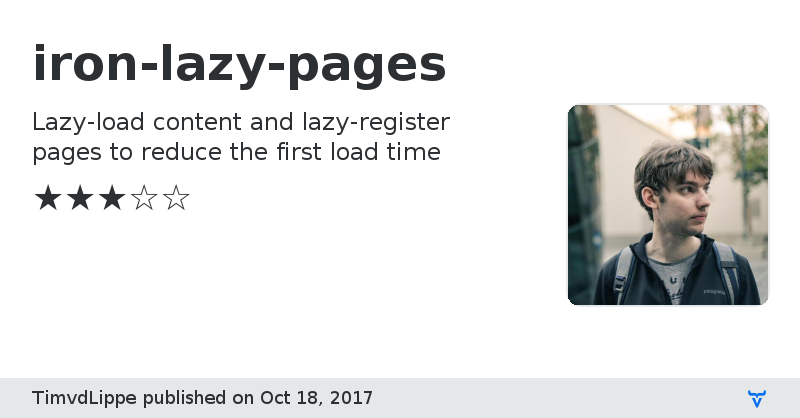iron-lazy-pages - Vaadin Add-on Directory
Lazy-load content and lazy-register pages to reduce the first load time
Leaving this tab and coming back will keep input value
Online Demo
Documentation
GitHub Homepage
View on NPM
Issue tracker
License
iron-lazy-pages version 0.1.0
### Dependencies
* polymer#Polymer/polymer#^1.0.0
* iron-selector#polymerelements/iron-selector#^1.0.0
iron-lazy-pages version 1.0.0
### Dependencies
* polymer#Polymer/polymer#^1.0.0
* iron-selector#polymerelements/iron-selector#^1.0.0
iron-lazy-pages version 1.0.1
### Dependencies
* polymer#Polymer/polymer#^1.0.0
* iron-selector#polymerelements/iron-selector#^1.0.0
iron-lazy-pages version 1.0.2
### Dependencies
* polymer#Polymer/polymer#^1.0.0
* iron-selector#polymerelements/iron-selector#^1.0.0
iron-lazy-pages version 1.1.0
### Dependencies
* polymer#Polymer/polymer#^1.0.0
* iron-selector#polymerelements/iron-selector#^1.0.0
iron-lazy-pages version 1.1.1
### Dependencies
* polymer#Polymer/polymer#^1.0.0
* iron-selector#polymerelements/iron-selector#^1.0.0
iron-lazy-pages version 1.2.0
### Dependencies
* polymer#Polymer/polymer#^1.0.0
* iron-selector#polymerelements/iron-selector#^1.0.0
iron-lazy-pages version 1.2.1
### Dependencies
* polymer#Polymer/polymer#^1.0.0
* iron-selector#polymerelements/iron-selector#^1.0.0
iron-lazy-pages version 1.3.0
### Dependencies
* polymer#Polymer/polymer#^1.0.0
* iron-selector#polymerelements/iron-selector#^1.0.0
iron-lazy-pages version 1.4.0
### Dependencies
* polymer#Polymer/polymer#^1.0.0
* iron-selector#polymerelements/iron-selector#^1.0.0
* neon-animation#PolymerElements/neon-animation#^1.0.0
iron-lazy-pages version 1.4.1
### Dependencies
* polymer#Polymer/polymer#^1.0.0
* iron-selector#polymerelements/iron-selector#^1.0.0
* neon-animation#PolymerElements/neon-animation#^1.0.0
iron-lazy-pages version 1.4.2
### Dependencies
* polymer#Polymer/polymer#^1.0.0
* iron-selector#polymerelements/iron-selector#^1.0.0
* neon-animation#PolymerElements/neon-animation#^1.0.0
iron-lazy-pages version 1.4.3
### Dependencies
* polymer#Polymer/polymer#^1.0.0
* iron-selector#polymerelements/iron-selector#^1.0.0
* neon-animation#PolymerElements/neon-animation#^1.0.0
iron-lazy-pages version 1.4.4
### Dependencies
* polymer#Polymer/polymer#^1.0.0
* iron-selector#polymerelements/iron-selector#^1.0.0
* neon-animation#PolymerElements/neon-animation#^1.0.0
iron-lazy-pages version 1.5.0
### Dependencies
* polymer#Polymer/polymer#^1.0.0
* iron-selector#polymerelements/iron-selector#^1.0.0
* neon-animation#PolymerElements/neon-animation#^1.0.0
iron-lazy-pages version 1.5.1
### Dependencies
* polymer#Polymer/polymer#^1.0.0
* iron-selector#polymerelements/iron-selector#^1.0.0
* neon-animation#PolymerElements/neon-animation#^1.0.0
iron-lazy-pages version 2.0.0
### Dependencies
* polymer#Polymer/polymer#^2.0.0
* iron-selector#PolymerElements/iron-selector#^2.0.0
iron-lazy-pages version 2.0.1
### Dependencies
* polymer#Polymer/polymer#^2.0.0
* iron-selector#PolymerElements/iron-selector#^2.0.0
iron-lazy-pages version 2.0.2
### Dependencies
* polymer#Polymer/polymer#^2.0.0
* iron-selector#PolymerElements/iron-selector#^2.0.0
iron-lazy-pages version 2.1.0
### Dependencies
* polymer#Polymer/polymer#^2.0.0
* iron-selector#PolymerElements/iron-selector#^2.0.0
iron-lazy-pages version 2.1.1
### Dependencies
* polymer#Polymer/polymer#^2.0.0
* iron-selector#PolymerElements/iron-selector#^2.0.0
iron-lazy-pages version 3.0.0
### Dependencies
* @polymer/polymer#^3.0.0
* @polymer/iron-selector#^3.0.0-pre.18
iron-lazy-pages version 3.0.1
### Dependencies
* @polymer/polymer#^3.0.0
* @polymer/iron-selector#^3.0.0-pre.18
iron-lazy-pages version 3.0.2
### Dependencies
* @polymer/polymer#^3.0.0
* @polymer/iron-selector#^3.0.0-pre.18